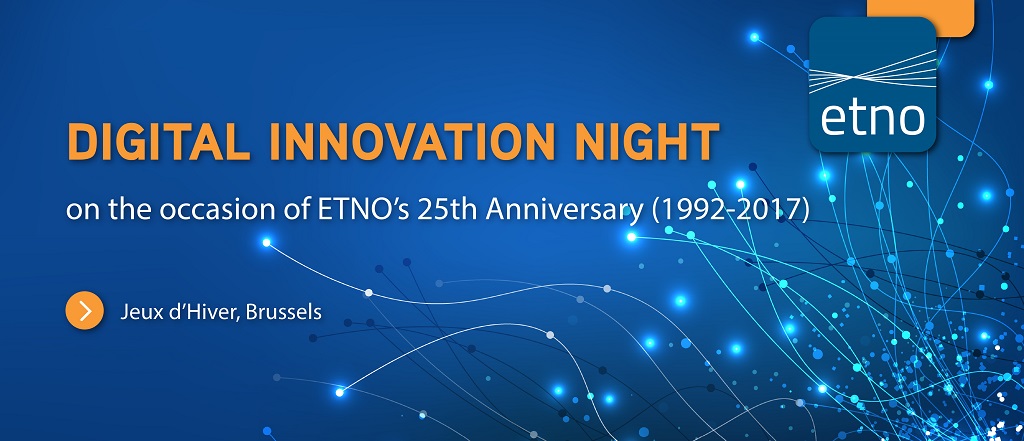
Digital Innovation Night
Date
Address
Section
Event Location
Event Description
The story
Has the European digital revolution started in 1992? It is at that time that some crucial trends began, with early signals of the mobile and connectivity boom coming together at the same time.
Europe was changing and so were markets, technology, policy and regulation. May 10, 1992 was a sunny day in Madrid, when a group of European telecom entrepreneurs gathered to found ETNO. It was the first association ever representing European Telecommunication Network Operators. On that lovely day of May, the hopes were high for technological progress and the very first foundations of the Digital Single Market were being laid out at the political level. The digital revolution, though, was yet to come: it was in their hearts, in their vision, in the networks that their companies were building and developing.
1992 is the year in which momentous events happened. Europe, first. On February 7, heads of state and government signed the Maastricht Treaty, effectively creating the European Union and laying the foundations for deeper political and economic integration, for a single market and for one currency.
At the same time, technology was booming. Dial-up internet, around since the ‘80s, was first commercially offered that year. At the same time, Nokia, one of the drivers of the mobile revolution, took the strategic decision to concentrate solely on telecommunications. In the same months, the very first digital hand-size mobile telephone was launched (Motorola International 3200). The first SMS was sent in UK, just one year after the first ever GSM call, which was made by the Finnish Prime Minister, then in Helsinki, to the Mayor of Tampere, a good 170 km away.
Today, European citizens are citizens of the world also thanks to powerful telecommunication services and networks. A wealth of new digital services has been developed on top of broadband connectivity. Consumer expectations and needs, industrial sectors, public administration and the society as a whole are being re-shaped by the power of communicating.
With networks becoming smarter and smarter, new opportunities are opening up. The Internet of Things is happening and it is expected to boom in the coming years. 5G is already being tested and EU operators plan to be available commercially already in 2020, with some pioneers expecting to launch already next year. As networks and services evolve, data analytics and artificial intelligence, promise to empower citizens with ever evolving standards of quality, increased choice and innovative applications.
The history of telecommunications is also the history of how humankind communicates. Join us to discuss how our digital future will look like and how innovative networks and services can help Europe build a new digital Union.
Details
Date: 10 May 2017
Time: 16.30h
Venue: Jeux d'Hiver, Chemin du Croquet 1, 1000 Brussels, Belgium
Twitter: #ETNO25
Programme
16.30 – 17.00: Registration & Welcome
17.00 – 18.30: A vision for innovation
• Dominique Leroy, CEO, Proximus
• John Foster, Director of Strategy, Telefónica Digital
18.30 – onwards: Join our Digital Reception, network, mingle and... bring home a digital 3D scan of yourself, brought to you by Of"Cores.
More to be announced...
Related Events
Kindly register for this event here.
As the EU moves into the next legislative term, industry and policy makers face the shared challenge of boosting Europe’s industrial competitiveness.
The upcoming US presidential election will not only significantly influence the United States but also extend its effects to the European Union.
The European Union (EU) has emerged as a prominent advocate for LGBTQIA+ rights globally, with significant strides made in recent years through initiatives like the LGBTIQ Equality Strategy 2020-2025, championed by key institutions such as the Commission and Parliament.
As we gear up for the upcoming European elections, it's crucial to actively participate in shaping the democratic landscape of our continent. To raise awareness and encourage engagement, we are launching the "Run for European Elections" campaign.
AEGIS Europe, an organisation
Pegasus, a spyware developed by NSO Group, is known for its capability to hijack a smartphone's microphone and camera, as well as access a wide array of personal data including emails, text messages, and documents.
The second edition of the Diplomatic Bazaar will take place in Brussels between December 8-10 in the Marble Hall of the Free University of Brussels.
The event will be held at the L42 Business Center - Rue de la Loi 42, 1040 Brussels&
A l’heure où la Conférence sur l’Avenir de l’Europe prend forme et au moment où se pose la question de la place du citoyen dans le débat sur l’Europe, l’antenne de Sauvons l’Europe en Belgique souhaite app
A discussion on the Just Transition mechanism with the European Commission as well as local, national and regional authorities and civil society who are the key drivers and most impacted by the ecological transition.
28 January 2020
WestMidland Europe Hub, avenue d’Auderghem, Brussels
SAVE-THE-DATE
Anti-Money Laundering in the Digital Era:
Non-governmental organisations (NGOs) are an indispensable part of civil society. However, NGO influence on policymaking is not always positive. A large number of well-connected NGOs explicitly aim to influence EU trade and investment policymaking.
Croatia currently holds the EU Council Presidency. Among the main priorities set for the next six months, there is the promotion of the well-being and stability of its immediate neighbourhood in Southeast Europe.





















